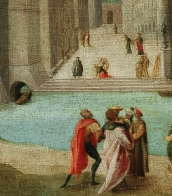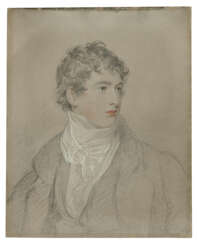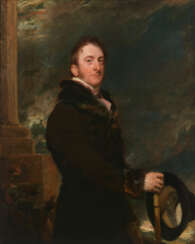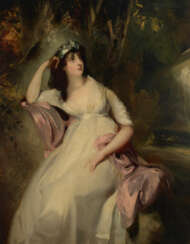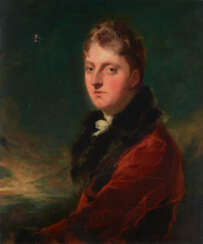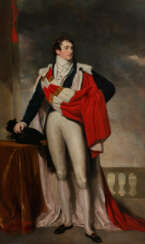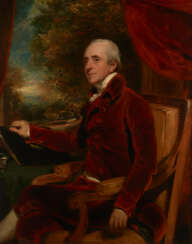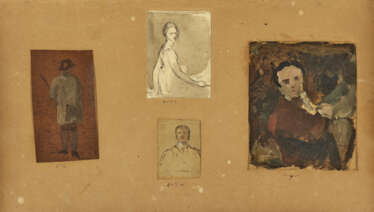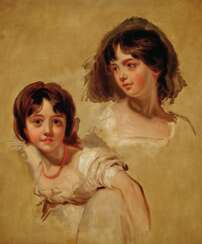Thomas Lawrence (1769 - 1830) — Auction price
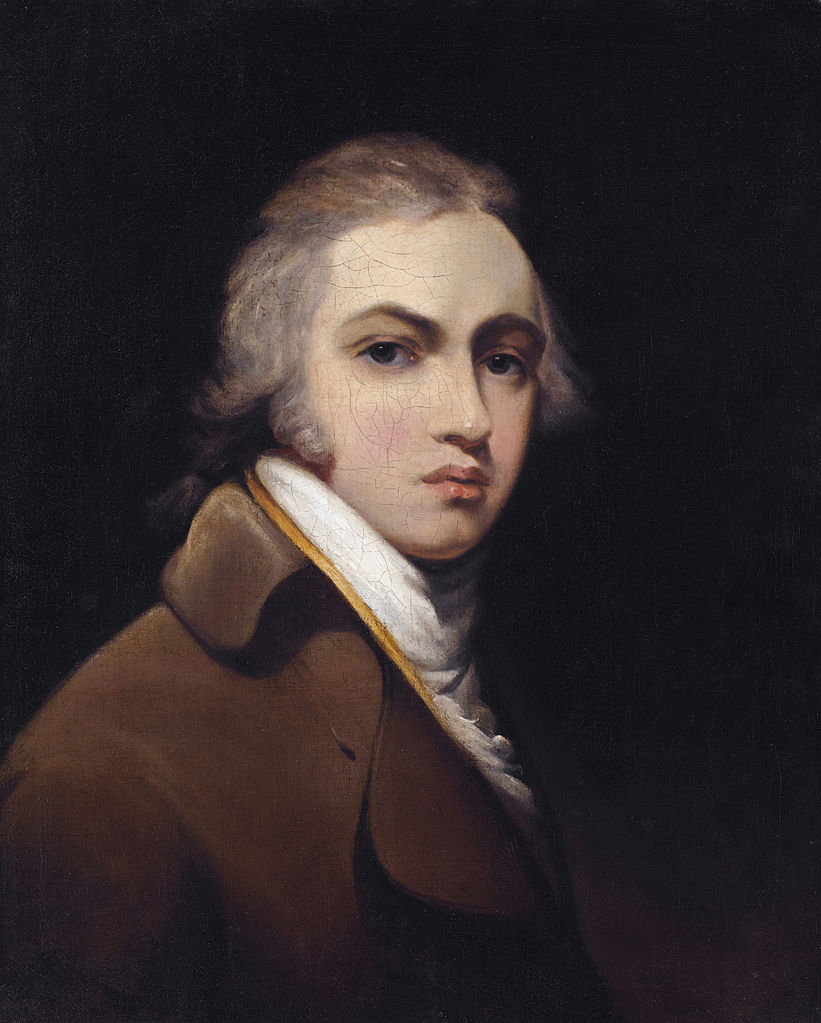
Thomas Lawrence was a prominent English painter, celebrated for his mastery in portraiture, who made a significant mark in the world of art and culture during the late 18th and early 19th centuries. Born in Bristol in 1769, Lawrence was a child prodigy, supporting his family through his artistic talents from a young age. His journey took him to Bath and eventually to London, where he swiftly established himself as a leading portrait artist, capturing the likenesses of society's most influential figures.
Thomas Lawrence's work is renowned for its elegance, capturing the essence and personality of his subjects with remarkable finesse. His ability to portray the delicate nuances of expression and character made his portraits highly sought after by the aristocracy and royalty alike. His commissions included portraits of King George III, Queen Charlotte, and the Prince Regent, as well as numerous other figures from the British and European nobility. Among his notable works are the portraits of Elizabeth Farren, soon to be the Countess of Derby, characterized by its vibrant expression and elegance, and the depiction of actress Sarah Siddons' daughters, which underscored his personal entanglements and the emotional depth he could convey through his art.
Despite his success, Thomas Lawrence's life was not without its challenges. He was perpetually in debt, a situation that puzzled his contemporaries given his tireless work ethic and the absence of any overt extravagance in his lifestyle. Furthermore, his romantic life was complicated, marked by his unfulfilled love for the Siddons sisters, which added a layer of personal tragedy to his story.
Thomas Lawrence's contributions to art were recognized by his election as a full member of the Royal Academy in 1794, and he later served as its president. His legacy is preserved in galleries and collections worldwide, including the National Gallery in London, which houses several of his masterpieces. His portraits of abolitionists and slave-owners alike reflect the complex social fabric of his time, offering a window into the era's cultural and historical context.
For collectors and experts in art and antiques, Thomas Lawrence's works represent not just aesthetic achievements but also valuable historical documents that capture the essence of an era. His portraits are a testament to the power of art to convey both the external likeness and the inner soul of the subject.
For those interested in the intersection of art, history, and culture, and who wish to stay informed about new discoveries, sales, and auction events related to Thomas Lawrence's work, signing up for updates is an invaluable resource. This ensures that enthusiasts and collectors alike remain at the forefront of developments in the world of art and antiques related to this illustrious painter.


Thomas Lawrence was a prominent English painter, celebrated for his mastery in portraiture, who made a significant mark in the world of art and culture during the late 18th and early 19th centuries. Born in Bristol in 1769, Lawrence was a child prodigy, supporting his family through his artistic talents from a young age. His journey took him to Bath and eventually to London, where he swiftly established himself as a leading portrait artist, capturing the likenesses of society's most influential figures.
Thomas Lawrence's work is renowned for its elegance, capturing the essence and personality of his subjects with remarkable finesse. His ability to portray the delicate nuances of expression and character made his portraits highly sought after by the aristocracy and royalty alike. His commissions included portraits of King George III, Queen Charlotte, and the Prince Regent, as well as numerous other figures from the British and European nobility. Among his notable works are the portraits of Elizabeth Farren, soon to be the Countess of Derby, characterized by its vibrant expression and elegance, and the depiction of actress Sarah Siddons' daughters, which underscored his personal entanglements and the emotional depth he could convey through his art.
Despite his success, Thomas Lawrence's life was not without its challenges. He was perpetually in debt, a situation that puzzled his contemporaries given his tireless work ethic and the absence of any overt extravagance in his lifestyle. Furthermore, his romantic life was complicated, marked by his unfulfilled love for the Siddons sisters, which added a layer of personal tragedy to his story.
Thomas Lawrence's contributions to art were recognized by his election as a full member of the Royal Academy in 1794, and he later served as its president. His legacy is preserved in galleries and collections worldwide, including the National Gallery in London, which houses several of his masterpieces. His portraits of abolitionists and slave-owners alike reflect the complex social fabric of his time, offering a window into the era's cultural and historical context.
For collectors and experts in art and antiques, Thomas Lawrence's works represent not just aesthetic achievements but also valuable historical documents that capture the essence of an era. His portraits are a testament to the power of art to convey both the external likeness and the inner soul of the subject.
For those interested in the intersection of art, history, and culture, and who wish to stay informed about new discoveries, sales, and auction events related to Thomas Lawrence's work, signing up for updates is an invaluable resource. This ensures that enthusiasts and collectors alike remain at the forefront of developments in the world of art and antiques related to this illustrious painter.
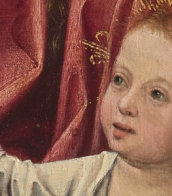

Thomas Lawrence was a prominent English painter, celebrated for his mastery in portraiture, who made a significant mark in the world of art and culture during the late 18th and early 19th centuries. Born in Bristol in 1769, Lawrence was a child prodigy, supporting his family through his artistic talents from a young age. His journey took him to Bath and eventually to London, where he swiftly established himself as a leading portrait artist, capturing the likenesses of society's most influential figures.
Thomas Lawrence's work is renowned for its elegance, capturing the essence and personality of his subjects with remarkable finesse. His ability to portray the delicate nuances of expression and character made his portraits highly sought after by the aristocracy and royalty alike. His commissions included portraits of King George III, Queen Charlotte, and the Prince Regent, as well as numerous other figures from the British and European nobility. Among his notable works are the portraits of Elizabeth Farren, soon to be the Countess of Derby, characterized by its vibrant expression and elegance, and the depiction of actress Sarah Siddons' daughters, which underscored his personal entanglements and the emotional depth he could convey through his art.
Despite his success, Thomas Lawrence's life was not without its challenges. He was perpetually in debt, a situation that puzzled his contemporaries given his tireless work ethic and the absence of any overt extravagance in his lifestyle. Furthermore, his romantic life was complicated, marked by his unfulfilled love for the Siddons sisters, which added a layer of personal tragedy to his story.
Thomas Lawrence's contributions to art were recognized by his election as a full member of the Royal Academy in 1794, and he later served as its president. His legacy is preserved in galleries and collections worldwide, including the National Gallery in London, which houses several of his masterpieces. His portraits of abolitionists and slave-owners alike reflect the complex social fabric of his time, offering a window into the era's cultural and historical context.
For collectors and experts in art and antiques, Thomas Lawrence's works represent not just aesthetic achievements but also valuable historical documents that capture the essence of an era. His portraits are a testament to the power of art to convey both the external likeness and the inner soul of the subject.
For those interested in the intersection of art, history, and culture, and who wish to stay informed about new discoveries, sales, and auction events related to Thomas Lawrence's work, signing up for updates is an invaluable resource. This ensures that enthusiasts and collectors alike remain at the forefront of developments in the world of art and antiques related to this illustrious painter.
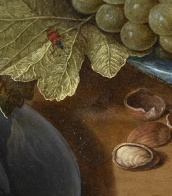

Thomas Lawrence was a prominent English painter, celebrated for his mastery in portraiture, who made a significant mark in the world of art and culture during the late 18th and early 19th centuries. Born in Bristol in 1769, Lawrence was a child prodigy, supporting his family through his artistic talents from a young age. His journey took him to Bath and eventually to London, where he swiftly established himself as a leading portrait artist, capturing the likenesses of society's most influential figures.
Thomas Lawrence's work is renowned for its elegance, capturing the essence and personality of his subjects with remarkable finesse. His ability to portray the delicate nuances of expression and character made his portraits highly sought after by the aristocracy and royalty alike. His commissions included portraits of King George III, Queen Charlotte, and the Prince Regent, as well as numerous other figures from the British and European nobility. Among his notable works are the portraits of Elizabeth Farren, soon to be the Countess of Derby, characterized by its vibrant expression and elegance, and the depiction of actress Sarah Siddons' daughters, which underscored his personal entanglements and the emotional depth he could convey through his art.
Despite his success, Thomas Lawrence's life was not without its challenges. He was perpetually in debt, a situation that puzzled his contemporaries given his tireless work ethic and the absence of any overt extravagance in his lifestyle. Furthermore, his romantic life was complicated, marked by his unfulfilled love for the Siddons sisters, which added a layer of personal tragedy to his story.
Thomas Lawrence's contributions to art were recognized by his election as a full member of the Royal Academy in 1794, and he later served as its president. His legacy is preserved in galleries and collections worldwide, including the National Gallery in London, which houses several of his masterpieces. His portraits of abolitionists and slave-owners alike reflect the complex social fabric of his time, offering a window into the era's cultural and historical context.
For collectors and experts in art and antiques, Thomas Lawrence's works represent not just aesthetic achievements but also valuable historical documents that capture the essence of an era. His portraits are a testament to the power of art to convey both the external likeness and the inner soul of the subject.
For those interested in the intersection of art, history, and culture, and who wish to stay informed about new discoveries, sales, and auction events related to Thomas Lawrence's work, signing up for updates is an invaluable resource. This ensures that enthusiasts and collectors alike remain at the forefront of developments in the world of art and antiques related to this illustrious painter.


Thomas Lawrence was a prominent English painter, celebrated for his mastery in portraiture, who made a significant mark in the world of art and culture during the late 18th and early 19th centuries. Born in Bristol in 1769, Lawrence was a child prodigy, supporting his family through his artistic talents from a young age. His journey took him to Bath and eventually to London, where he swiftly established himself as a leading portrait artist, capturing the likenesses of society's most influential figures.
Thomas Lawrence's work is renowned for its elegance, capturing the essence and personality of his subjects with remarkable finesse. His ability to portray the delicate nuances of expression and character made his portraits highly sought after by the aristocracy and royalty alike. His commissions included portraits of King George III, Queen Charlotte, and the Prince Regent, as well as numerous other figures from the British and European nobility. Among his notable works are the portraits of Elizabeth Farren, soon to be the Countess of Derby, characterized by its vibrant expression and elegance, and the depiction of actress Sarah Siddons' daughters, which underscored his personal entanglements and the emotional depth he could convey through his art.
Despite his success, Thomas Lawrence's life was not without its challenges. He was perpetually in debt, a situation that puzzled his contemporaries given his tireless work ethic and the absence of any overt extravagance in his lifestyle. Furthermore, his romantic life was complicated, marked by his unfulfilled love for the Siddons sisters, which added a layer of personal tragedy to his story.
Thomas Lawrence's contributions to art were recognized by his election as a full member of the Royal Academy in 1794, and he later served as its president. His legacy is preserved in galleries and collections worldwide, including the National Gallery in London, which houses several of his masterpieces. His portraits of abolitionists and slave-owners alike reflect the complex social fabric of his time, offering a window into the era's cultural and historical context.
For collectors and experts in art and antiques, Thomas Lawrence's works represent not just aesthetic achievements but also valuable historical documents that capture the essence of an era. His portraits are a testament to the power of art to convey both the external likeness and the inner soul of the subject.
For those interested in the intersection of art, history, and culture, and who wish to stay informed about new discoveries, sales, and auction events related to Thomas Lawrence's work, signing up for updates is an invaluable resource. This ensures that enthusiasts and collectors alike remain at the forefront of developments in the world of art and antiques related to this illustrious painter.
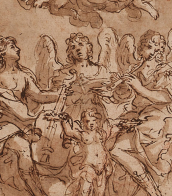

Thomas Lawrence was a prominent English painter, celebrated for his mastery in portraiture, who made a significant mark in the world of art and culture during the late 18th and early 19th centuries. Born in Bristol in 1769, Lawrence was a child prodigy, supporting his family through his artistic talents from a young age. His journey took him to Bath and eventually to London, where he swiftly established himself as a leading portrait artist, capturing the likenesses of society's most influential figures.
Thomas Lawrence's work is renowned for its elegance, capturing the essence and personality of his subjects with remarkable finesse. His ability to portray the delicate nuances of expression and character made his portraits highly sought after by the aristocracy and royalty alike. His commissions included portraits of King George III, Queen Charlotte, and the Prince Regent, as well as numerous other figures from the British and European nobility. Among his notable works are the portraits of Elizabeth Farren, soon to be the Countess of Derby, characterized by its vibrant expression and elegance, and the depiction of actress Sarah Siddons' daughters, which underscored his personal entanglements and the emotional depth he could convey through his art.
Despite his success, Thomas Lawrence's life was not without its challenges. He was perpetually in debt, a situation that puzzled his contemporaries given his tireless work ethic and the absence of any overt extravagance in his lifestyle. Furthermore, his romantic life was complicated, marked by his unfulfilled love for the Siddons sisters, which added a layer of personal tragedy to his story.
Thomas Lawrence's contributions to art were recognized by his election as a full member of the Royal Academy in 1794, and he later served as its president. His legacy is preserved in galleries and collections worldwide, including the National Gallery in London, which houses several of his masterpieces. His portraits of abolitionists and slave-owners alike reflect the complex social fabric of his time, offering a window into the era's cultural and historical context.
For collectors and experts in art and antiques, Thomas Lawrence's works represent not just aesthetic achievements but also valuable historical documents that capture the essence of an era. His portraits are a testament to the power of art to convey both the external likeness and the inner soul of the subject.
For those interested in the intersection of art, history, and culture, and who wish to stay informed about new discoveries, sales, and auction events related to Thomas Lawrence's work, signing up for updates is an invaluable resource. This ensures that enthusiasts and collectors alike remain at the forefront of developments in the world of art and antiques related to this illustrious painter.
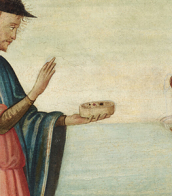

Thomas Lawrence was a prominent English painter, celebrated for his mastery in portraiture, who made a significant mark in the world of art and culture during the late 18th and early 19th centuries. Born in Bristol in 1769, Lawrence was a child prodigy, supporting his family through his artistic talents from a young age. His journey took him to Bath and eventually to London, where he swiftly established himself as a leading portrait artist, capturing the likenesses of society's most influential figures.
Thomas Lawrence's work is renowned for its elegance, capturing the essence and personality of his subjects with remarkable finesse. His ability to portray the delicate nuances of expression and character made his portraits highly sought after by the aristocracy and royalty alike. His commissions included portraits of King George III, Queen Charlotte, and the Prince Regent, as well as numerous other figures from the British and European nobility. Among his notable works are the portraits of Elizabeth Farren, soon to be the Countess of Derby, characterized by its vibrant expression and elegance, and the depiction of actress Sarah Siddons' daughters, which underscored his personal entanglements and the emotional depth he could convey through his art.
Despite his success, Thomas Lawrence's life was not without its challenges. He was perpetually in debt, a situation that puzzled his contemporaries given his tireless work ethic and the absence of any overt extravagance in his lifestyle. Furthermore, his romantic life was complicated, marked by his unfulfilled love for the Siddons sisters, which added a layer of personal tragedy to his story.
Thomas Lawrence's contributions to art were recognized by his election as a full member of the Royal Academy in 1794, and he later served as its president. His legacy is preserved in galleries and collections worldwide, including the National Gallery in London, which houses several of his masterpieces. His portraits of abolitionists and slave-owners alike reflect the complex social fabric of his time, offering a window into the era's cultural and historical context.
For collectors and experts in art and antiques, Thomas Lawrence's works represent not just aesthetic achievements but also valuable historical documents that capture the essence of an era. His portraits are a testament to the power of art to convey both the external likeness and the inner soul of the subject.
For those interested in the intersection of art, history, and culture, and who wish to stay informed about new discoveries, sales, and auction events related to Thomas Lawrence's work, signing up for updates is an invaluable resource. This ensures that enthusiasts and collectors alike remain at the forefront of developments in the world of art and antiques related to this illustrious painter.
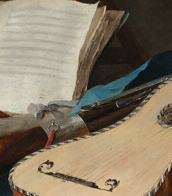

Thomas Lawrence was a prominent English painter, celebrated for his mastery in portraiture, who made a significant mark in the world of art and culture during the late 18th and early 19th centuries. Born in Bristol in 1769, Lawrence was a child prodigy, supporting his family through his artistic talents from a young age. His journey took him to Bath and eventually to London, where he swiftly established himself as a leading portrait artist, capturing the likenesses of society's most influential figures.
Thomas Lawrence's work is renowned for its elegance, capturing the essence and personality of his subjects with remarkable finesse. His ability to portray the delicate nuances of expression and character made his portraits highly sought after by the aristocracy and royalty alike. His commissions included portraits of King George III, Queen Charlotte, and the Prince Regent, as well as numerous other figures from the British and European nobility. Among his notable works are the portraits of Elizabeth Farren, soon to be the Countess of Derby, characterized by its vibrant expression and elegance, and the depiction of actress Sarah Siddons' daughters, which underscored his personal entanglements and the emotional depth he could convey through his art.
Despite his success, Thomas Lawrence's life was not without its challenges. He was perpetually in debt, a situation that puzzled his contemporaries given his tireless work ethic and the absence of any overt extravagance in his lifestyle. Furthermore, his romantic life was complicated, marked by his unfulfilled love for the Siddons sisters, which added a layer of personal tragedy to his story.
Thomas Lawrence's contributions to art were recognized by his election as a full member of the Royal Academy in 1794, and he later served as its president. His legacy is preserved in galleries and collections worldwide, including the National Gallery in London, which houses several of his masterpieces. His portraits of abolitionists and slave-owners alike reflect the complex social fabric of his time, offering a window into the era's cultural and historical context.
For collectors and experts in art and antiques, Thomas Lawrence's works represent not just aesthetic achievements but also valuable historical documents that capture the essence of an era. His portraits are a testament to the power of art to convey both the external likeness and the inner soul of the subject.
For those interested in the intersection of art, history, and culture, and who wish to stay informed about new discoveries, sales, and auction events related to Thomas Lawrence's work, signing up for updates is an invaluable resource. This ensures that enthusiasts and collectors alike remain at the forefront of developments in the world of art and antiques related to this illustrious painter.
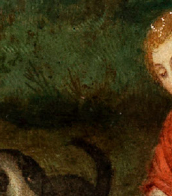

Thomas Lawrence was a prominent English painter, celebrated for his mastery in portraiture, who made a significant mark in the world of art and culture during the late 18th and early 19th centuries. Born in Bristol in 1769, Lawrence was a child prodigy, supporting his family through his artistic talents from a young age. His journey took him to Bath and eventually to London, where he swiftly established himself as a leading portrait artist, capturing the likenesses of society's most influential figures.
Thomas Lawrence's work is renowned for its elegance, capturing the essence and personality of his subjects with remarkable finesse. His ability to portray the delicate nuances of expression and character made his portraits highly sought after by the aristocracy and royalty alike. His commissions included portraits of King George III, Queen Charlotte, and the Prince Regent, as well as numerous other figures from the British and European nobility. Among his notable works are the portraits of Elizabeth Farren, soon to be the Countess of Derby, characterized by its vibrant expression and elegance, and the depiction of actress Sarah Siddons' daughters, which underscored his personal entanglements and the emotional depth he could convey through his art.
Despite his success, Thomas Lawrence's life was not without its challenges. He was perpetually in debt, a situation that puzzled his contemporaries given his tireless work ethic and the absence of any overt extravagance in his lifestyle. Furthermore, his romantic life was complicated, marked by his unfulfilled love for the Siddons sisters, which added a layer of personal tragedy to his story.
Thomas Lawrence's contributions to art were recognized by his election as a full member of the Royal Academy in 1794, and he later served as its president. His legacy is preserved in galleries and collections worldwide, including the National Gallery in London, which houses several of his masterpieces. His portraits of abolitionists and slave-owners alike reflect the complex social fabric of his time, offering a window into the era's cultural and historical context.
For collectors and experts in art and antiques, Thomas Lawrence's works represent not just aesthetic achievements but also valuable historical documents that capture the essence of an era. His portraits are a testament to the power of art to convey both the external likeness and the inner soul of the subject.
For those interested in the intersection of art, history, and culture, and who wish to stay informed about new discoveries, sales, and auction events related to Thomas Lawrence's work, signing up for updates is an invaluable resource. This ensures that enthusiasts and collectors alike remain at the forefront of developments in the world of art and antiques related to this illustrious painter.
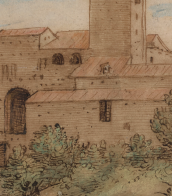

Thomas Lawrence was a prominent English painter, celebrated for his mastery in portraiture, who made a significant mark in the world of art and culture during the late 18th and early 19th centuries. Born in Bristol in 1769, Lawrence was a child prodigy, supporting his family through his artistic talents from a young age. His journey took him to Bath and eventually to London, where he swiftly established himself as a leading portrait artist, capturing the likenesses of society's most influential figures.
Thomas Lawrence's work is renowned for its elegance, capturing the essence and personality of his subjects with remarkable finesse. His ability to portray the delicate nuances of expression and character made his portraits highly sought after by the aristocracy and royalty alike. His commissions included portraits of King George III, Queen Charlotte, and the Prince Regent, as well as numerous other figures from the British and European nobility. Among his notable works are the portraits of Elizabeth Farren, soon to be the Countess of Derby, characterized by its vibrant expression and elegance, and the depiction of actress Sarah Siddons' daughters, which underscored his personal entanglements and the emotional depth he could convey through his art.
Despite his success, Thomas Lawrence's life was not without its challenges. He was perpetually in debt, a situation that puzzled his contemporaries given his tireless work ethic and the absence of any overt extravagance in his lifestyle. Furthermore, his romantic life was complicated, marked by his unfulfilled love for the Siddons sisters, which added a layer of personal tragedy to his story.
Thomas Lawrence's contributions to art were recognized by his election as a full member of the Royal Academy in 1794, and he later served as its president. His legacy is preserved in galleries and collections worldwide, including the National Gallery in London, which houses several of his masterpieces. His portraits of abolitionists and slave-owners alike reflect the complex social fabric of his time, offering a window into the era's cultural and historical context.
For collectors and experts in art and antiques, Thomas Lawrence's works represent not just aesthetic achievements but also valuable historical documents that capture the essence of an era. His portraits are a testament to the power of art to convey both the external likeness and the inner soul of the subject.
For those interested in the intersection of art, history, and culture, and who wish to stay informed about new discoveries, sales, and auction events related to Thomas Lawrence's work, signing up for updates is an invaluable resource. This ensures that enthusiasts and collectors alike remain at the forefront of developments in the world of art and antiques related to this illustrious painter.


Thomas Lawrence was a prominent English painter, celebrated for his mastery in portraiture, who made a significant mark in the world of art and culture during the late 18th and early 19th centuries. Born in Bristol in 1769, Lawrence was a child prodigy, supporting his family through his artistic talents from a young age. His journey took him to Bath and eventually to London, where he swiftly established himself as a leading portrait artist, capturing the likenesses of society's most influential figures.
Thomas Lawrence's work is renowned for its elegance, capturing the essence and personality of his subjects with remarkable finesse. His ability to portray the delicate nuances of expression and character made his portraits highly sought after by the aristocracy and royalty alike. His commissions included portraits of King George III, Queen Charlotte, and the Prince Regent, as well as numerous other figures from the British and European nobility. Among his notable works are the portraits of Elizabeth Farren, soon to be the Countess of Derby, characterized by its vibrant expression and elegance, and the depiction of actress Sarah Siddons' daughters, which underscored his personal entanglements and the emotional depth he could convey through his art.
Despite his success, Thomas Lawrence's life was not without its challenges. He was perpetually in debt, a situation that puzzled his contemporaries given his tireless work ethic and the absence of any overt extravagance in his lifestyle. Furthermore, his romantic life was complicated, marked by his unfulfilled love for the Siddons sisters, which added a layer of personal tragedy to his story.
Thomas Lawrence's contributions to art were recognized by his election as a full member of the Royal Academy in 1794, and he later served as its president. His legacy is preserved in galleries and collections worldwide, including the National Gallery in London, which houses several of his masterpieces. His portraits of abolitionists and slave-owners alike reflect the complex social fabric of his time, offering a window into the era's cultural and historical context.
For collectors and experts in art and antiques, Thomas Lawrence's works represent not just aesthetic achievements but also valuable historical documents that capture the essence of an era. His portraits are a testament to the power of art to convey both the external likeness and the inner soul of the subject.
For those interested in the intersection of art, history, and culture, and who wish to stay informed about new discoveries, sales, and auction events related to Thomas Lawrence's work, signing up for updates is an invaluable resource. This ensures that enthusiasts and collectors alike remain at the forefront of developments in the world of art and antiques related to this illustrious painter.
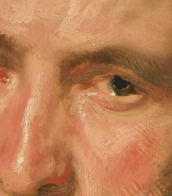

Thomas Lawrence was a prominent English painter, celebrated for his mastery in portraiture, who made a significant mark in the world of art and culture during the late 18th and early 19th centuries. Born in Bristol in 1769, Lawrence was a child prodigy, supporting his family through his artistic talents from a young age. His journey took him to Bath and eventually to London, where he swiftly established himself as a leading portrait artist, capturing the likenesses of society's most influential figures.
Thomas Lawrence's work is renowned for its elegance, capturing the essence and personality of his subjects with remarkable finesse. His ability to portray the delicate nuances of expression and character made his portraits highly sought after by the aristocracy and royalty alike. His commissions included portraits of King George III, Queen Charlotte, and the Prince Regent, as well as numerous other figures from the British and European nobility. Among his notable works are the portraits of Elizabeth Farren, soon to be the Countess of Derby, characterized by its vibrant expression and elegance, and the depiction of actress Sarah Siddons' daughters, which underscored his personal entanglements and the emotional depth he could convey through his art.
Despite his success, Thomas Lawrence's life was not without its challenges. He was perpetually in debt, a situation that puzzled his contemporaries given his tireless work ethic and the absence of any overt extravagance in his lifestyle. Furthermore, his romantic life was complicated, marked by his unfulfilled love for the Siddons sisters, which added a layer of personal tragedy to his story.
Thomas Lawrence's contributions to art were recognized by his election as a full member of the Royal Academy in 1794, and he later served as its president. His legacy is preserved in galleries and collections worldwide, including the National Gallery in London, which houses several of his masterpieces. His portraits of abolitionists and slave-owners alike reflect the complex social fabric of his time, offering a window into the era's cultural and historical context.
For collectors and experts in art and antiques, Thomas Lawrence's works represent not just aesthetic achievements but also valuable historical documents that capture the essence of an era. His portraits are a testament to the power of art to convey both the external likeness and the inner soul of the subject.
For those interested in the intersection of art, history, and culture, and who wish to stay informed about new discoveries, sales, and auction events related to Thomas Lawrence's work, signing up for updates is an invaluable resource. This ensures that enthusiasts and collectors alike remain at the forefront of developments in the world of art and antiques related to this illustrious painter.
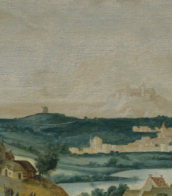

Thomas Lawrence was a prominent English painter, celebrated for his mastery in portraiture, who made a significant mark in the world of art and culture during the late 18th and early 19th centuries. Born in Bristol in 1769, Lawrence was a child prodigy, supporting his family through his artistic talents from a young age. His journey took him to Bath and eventually to London, where he swiftly established himself as a leading portrait artist, capturing the likenesses of society's most influential figures.
Thomas Lawrence's work is renowned for its elegance, capturing the essence and personality of his subjects with remarkable finesse. His ability to portray the delicate nuances of expression and character made his portraits highly sought after by the aristocracy and royalty alike. His commissions included portraits of King George III, Queen Charlotte, and the Prince Regent, as well as numerous other figures from the British and European nobility. Among his notable works are the portraits of Elizabeth Farren, soon to be the Countess of Derby, characterized by its vibrant expression and elegance, and the depiction of actress Sarah Siddons' daughters, which underscored his personal entanglements and the emotional depth he could convey through his art.
Despite his success, Thomas Lawrence's life was not without its challenges. He was perpetually in debt, a situation that puzzled his contemporaries given his tireless work ethic and the absence of any overt extravagance in his lifestyle. Furthermore, his romantic life was complicated, marked by his unfulfilled love for the Siddons sisters, which added a layer of personal tragedy to his story.
Thomas Lawrence's contributions to art were recognized by his election as a full member of the Royal Academy in 1794, and he later served as its president. His legacy is preserved in galleries and collections worldwide, including the National Gallery in London, which houses several of his masterpieces. His portraits of abolitionists and slave-owners alike reflect the complex social fabric of his time, offering a window into the era's cultural and historical context.
For collectors and experts in art and antiques, Thomas Lawrence's works represent not just aesthetic achievements but also valuable historical documents that capture the essence of an era. His portraits are a testament to the power of art to convey both the external likeness and the inner soul of the subject.
For those interested in the intersection of art, history, and culture, and who wish to stay informed about new discoveries, sales, and auction events related to Thomas Lawrence's work, signing up for updates is an invaluable resource. This ensures that enthusiasts and collectors alike remain at the forefront of developments in the world of art and antiques related to this illustrious painter.
